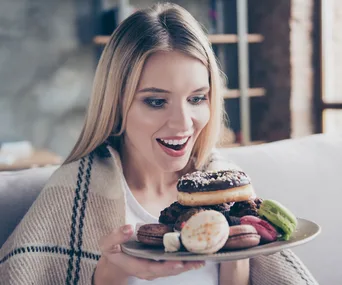I’m sure I’m not alone when I say that when boredom hits I often find myself staring at the contents of the fridge or pantry, ready to grab whichever snack has the highest level of sugar, salt or fat content.
The same goes for when I’m stressed or have had a particularly rough day – at my previous job at a quarterly magazine you can bet that there’d be a colourful (artificial of course) array of sweets to choose from and a couple of blocks of chocolate on hand come deadline week.
A mouthful of the sugary goodness is often followed by someone exclaiming guiltily, “Oh my god, get this away from me,” before coming in for another handful five minutes later.
And it is these exact scenarios that body and mind transformation expert and founder of MindFoodNess Eugenia Nikiforow says contributes to why we may binge or emotionally eat.
Namely, stress and restrictive dieting.
Using food as a comfort blanket
Eugenia, who is also a mindfulness and nutrition coach, explains that there are many complex reasons why someone might binge or emotionally eat, but one very common one is stress.

Eugenia says there are about six different reasons someone might binge or emotionally eat, but the most common on is stress. (Image: Getty)
“When we feel stressed and we experience certain emotions that we don’t feel comfortable with, food, for example chocolate, can become like a drug – it helps to distract us,” Eugenia says.
“It helps us feel good for a moment because chocolate, or food in general, especially if it’s the perfect combination between sugar, fat and salt, stimulates the reward system in the brain.
“It helps to release the feel-good hormones like endorphins, dopamine and serotonin, so it calms us down and we can feel calm for a moment,” explains Eugenia.
Eugenia also reveals that many times the reason we turn to food for comfort can stem from our childhood, learning early on to associate sweet treats with feeling better and cared for.
“If our parents would gave us a lolly when we cried or when we went to the dentist and they’d say, ‘oh you’ve been a good girl,’ and gave us a sweet,” she says.
“It’s like an association and an emotional attachment as well and we have those memories and feelings of comfort we had, so we’re craving the love and connection, rather than the actual food.”
The forbidden fruit: The ‘naughtier’ it is, the more you want it
Eugenia says that along with stress there’s also the effect that restricting foods and dieting has.
With fad diets cropping up left, right and centre people are more eager than ever to try new ways of eating for weight loss.
This, in itself, presents other issues surrounding body image, something Eugenia is very familiar with.
For ten years she struggled with eating disorders, thinking that if she was thin she’d be more accepted.
It took a long time, and a move from Germany to New Zealand for her to realise she didn’t need to change her body to belong, and it was this realisation which led to her help others.
Eugenia explains, more often than not, dieting will entail ruling out a lot of different kinds of food, which is actually where binge eating can develop.

Believe it or not, diets and restrictive eating can lead to binge eating. (Image: Getty)
“If we have that belief something is ‘naughty food’ it becomes more appealing to us because we think we’re doing something that’s forbidden.
“It’s what we call anticipated scarcity.
“If something is not available to us, again it’s like, we use it in marketing, ‘limited amount, limited edition,’ if something is limited to us, we want it – now!”
So basically if we’re dieting and restricting food, we’re constantly thinking about the food we can’t have, making us crave it even more and then once we have, for example chocolate, within our grasp, our brain anticipates scarcity and thinks, ‘might as well go for the whole block’.
It then can become a vicious cycle, where you feel guilty for eating the ‘naughty’ food and go on an extreme restrictive diet again, just to fall into the same pattern.
“Stress and restricting and dieting are the two most common reasons behind binge eating,” Eugenie says, “for women in particular.”
So how can you stop yourself from binge eating?
Eugenia says it begins by separating the food from the emotions.
She says that while yes, the foods we turn to when we’re stressed or feel uncomfortable with our strong emotions, tastes good, the majority of the time we’ll eat it so fast or so mindlessly that we don’t even really taste it at all.
“We taste it in the first few bites and the rest is just mindless.
“So in that moment we eat because we want to change how we feel. So the question is, how can I change the way I feel in other ways?”

Eugenia says many times the reason for binge eating can be because we want to distract ourselves from negative emotions, so instead we should find other ways to change our emotions that don’t involve food. (Image: Getty)
There are three tools in particular that she uses with her clients, Eugenia says – deep belly breathing, gratitude and movement. She says it’s a long process, but being mindful and using these tools may help.
1. Deep belly breathing
Eugenia explains that when we’re stressed we breathe shallow, our cortisol (stress hormone) and adrenaline goes up and that’s what makes us feel stressed.
However she says that when we breathe from our belly, we’re stimulating the parasympathetic nervous system, which helps our body release hormones that calm us down.
2. Being grateful
It may sound strange, or incredibly simple, but Eugenia says the practice of gratitude works very powerfully.
If you’re feeling stressed or upset, instead of turning to food try and think of the things in your life that you’re grateful for, much like the practice of keeping a gratitude journal.
Eugenia explains that humans can’t feel frustrated and grateful at the same time. That’s why practising gratitude can help to calm us down and change our feelings, or our ‘state’.
3. Moving and changing our physiology
Eugenia says one of the easiest ways of changing our mindset is to change our physiology, in other words, our body.
“What I mean by this is put your shoulders up, pull your chest up, breath more deeply, go for a walk, move.
“When we start moving we start feeling different, whether it’s going for a walk, jumping around or dancing.”
WATCH: 3 achievable ways to to cope with stress and anxiety in every day life. Story continues below…
When clients come to Eugenia, she says she helps them to eat intuitively, to stop labelling food as ‘good’ and ‘bad’ and to listen to their body about how it feels and what it needs.
It’s asking your body, ‘what food makes me feel good physically?’, Eugenia says.
She explains it’s about moderation, not ruling any foods out, but not going overboard either.
You’re definitely not going to feel great after eating half a block of chocolate every day, but if you’re eating a couple of pieces a day plus plenty of nutrient-rich food that makes you feel good and gives you plenty of energy, it’s a win-win!
So, a little bit of everything in moderation? You don’t have to tell us twice!
Eugenia Nikiforow is an Emotional Eating and Eating Psychology expert with a certificate in Holistic Nutrition and Health and a degree in Business Psychology. You can find out more by visiting her website: mindfoodness.nz
 Shutterstock
Shutterstock


